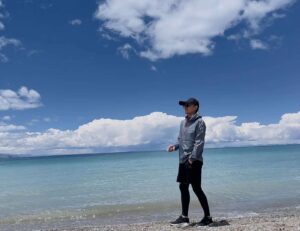YC’s journey from last summer to PhD

Breathing in the thin but fresh air of Himalayas, and bathed in the most dazzling sunlight besides Namtso, I was on a road trip across Tibet last summer. Right after resigning from my last job, one of my closest friends just started the career as an English teacher there, so we drove 3,000 kilometres from our hometown to Lhasa, to let myself enjoy the break before starting my PhD at Edinburgh, and to send my friend’s vehicle there for traveling around in one of the highest places in the world.
Only knowing for sure I want to work on life science, I am always open to new experiences at different places. Born and raised up in mainland China, I took the offer to study biology in Hong Kong after Chinese uni entrance exam, funded by my school to do a research internship in Boston investigating retina regeneration, and received a scholarship to further my education in London. After graduation, I worked in NGS industry as a bioinformatician, focusing on cancer genetics research and potential product development. While my job emphasis shifted more from basic researches towards product development, I realized I am rather more interested in studying the scientific logics behind what analysing massive data shows us. I also found it’s quite necessary to reach more solid biological explanations before translating our findings from bench to bed. While many life plans were resumed from the pause due to pandemic, I thought maybe it was the right time for me to recharge and resume my educational plan.
Luckily, I got the offer to start my PhD journey here at MRC Human Genetics Unit; luckily, I received intensive but useful systematic trainings that sharpened my dry-lab skills and filled in my knowledge gaps; and more luckily, I had an extremely productive and wonderful time in Prof. Andrew Jackson’s lab, where I did my first rotation studying the molecular mechanisms underlying the formation of mutation signature ID4. My supervisors Prof. Andrew Jackson, Dr. Martin Reijns and Dr. Diana Rios Szwed were such good instructors that I could literally learn new things everyday. Colleagues in my lab were honestly so considerate, welcoming, thoughtful, friendly and fun that I am already feeling nostalgic one week after finishing up.
My journey continues. I am heading to Prof. Martin Taylor’s lab to study lesion segregation signals in peripheral blood for my second rotation, and I am sure it will be another precious and lucky experience for learning and trying new things.



